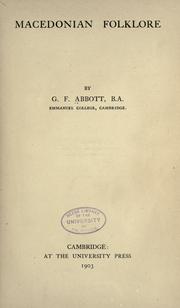Check nearby libraries
Buy this book

Author introduction: "The present volume contains the results of some researches into the folklore of the Greek-speaking parts of Macedonia, carried on in 1900-1 by the author under the auspices of the Electors to the Prendergast Studentship and of the Governing Body of Emmanuel College."
Check nearby libraries
Buy this book

Showing 10 featured editions. View all 10 editions?
| Edition | Availability |
|---|---|
| 01 |
zzzz
Libraries near you:
WorldCat
|
| 02 |
zzzz
Libraries near you:
WorldCat
|
| 03 |
zzzz
Libraries near you:
WorldCat
|
| 04 |
zzzz
Libraries near you:
WorldCat
|
| 05 |
zzzz
|
| 06 |
zzzz
Libraries near you:
WorldCat
|
| 07 |
bbbb
|
| 08 |
zzzz
|
| 09 |
zzzz
Libraries near you:
WorldCat
|
| 10 |
aaaa
Libraries near you:
WorldCat
|
Book Details
Published in
Cambridge
Table of Contents
Classifications
The Physical Object
ID Numbers
Work Description
This is a book about Greek folklore.
Millenia before Slavs arrive to Balkans, native greek populations were sharing essensially the same civilisation like their southern compatriots. During hellenistic and roman times use of the name "Macedonia", originally reffering to Aliakmon river valley, expanded to cover all Greek (and later Roman) conquests. Racial intermixing in Roman and Byzantine times, with the advent of Latin settlers from Italian peninsula and Slavs from Central Europe changed national composition in northern parts (what became Yugoslavia in more recent times). Southern parts, on the other hands, in substantial unity with the rest of the greek world retained a greek majority throughout Middle Ages and ottoman occupation.
Thus, religious and cultural aspects of the Ancient Greeks, preserved for us by the greek and roman classics, survived to the 20th century, sometimes not christianized at all, in an otherwise fervent greek-orthodox community. Northern greeks are generally thought to have preserved their cultural identity in a more pure form than the rest, mainly because they joined the greek state after the first century of its existance, escaping both national hysteria caused by Fallmerayer's theories and the state-led forced westernisation of the first years of independence, while benefiting by the progress achieved during ten decades of greek anthropological and ethnographical scholarship.
Note that G. F. Abbott's "Macedonian folklore" also has the quality of a genuine source. Written before the major events that shaped modern Macedonia, it is a field-researcher's account of the hellenic folklore during the last days of ottoman rule. Next 50 years saw a density of historical events like the epic "Macedonian Struggle / Μακεδονικός Αγώνας", two Balkan Wars, two World Wars and the Greek Civil War. Macedonia was divided between Greece, Yugoslavia and Bulgaria with each one of them annexing parts where respective populations were dominant, thus creating almost -but not entirely- homogenous nations.
After the settlement of Greek refugees from Asia Minor, local hellenic traditions suffered by intermingling and then, recent modernization influenced traditional societies heavily. Modern revivals become more and more artificial, just for the tourists and TV crews, and here lies the significance of G. F. Abbott's work. Is one of the last veritable reports about greek folklore available in English, just right before this 3000 years-old interminable tradition was wipped by the modernity of our times.
Luciano Par' Abati
Community Reviews (0)
Feedback?History
- Created April 1, 2008
- 12 revisions
Wikipedia citation
×CloseCopy and paste this code into your Wikipedia page. Need help?
| November 15, 2023 | Edited by MARC Bot | import existing book |
| April 14, 2010 | Edited by Open Library Bot | Linked existing covers to the edition. |
| December 14, 2009 | Edited by WorkBot | link works |
| December 13, 2009 | Edited by 94.66.6.111 | Edited without comment. |
| April 1, 2008 | Created by an anonymous user | Imported from Internet Archive item record. |











